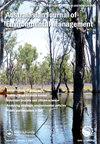Exploring conceptualisations of ‘connections to nature’ from an environmental management perspective: a case study in Tāmaki Makaurau Auckland, Aotearoa New Zealand
IF 1.5
4区 社会学
Q4 ENVIRONMENTAL STUDIES
Australasian Journal of Environmental Management
Pub Date : 2022-01-02
DOI:10.1080/14486563.2022.2035834
引用次数: 1
Abstract
ABSTRACT Disconnect between humans and nature has been considered a driver of contemporary environmental crises. This has resulted in environmental managers calling for society to ‘re-connect’ with nature for future sustainability. However, conceptualisations of ‘connections to nature’ are fragmented in theoretical terms and practical application, as empirical research in environmental management literature exploring lay people’s conceptualisations of their personal ‘connections to nature’ is scarce. This raises a key issue: if environmental managers do not know what they are aiming for, how can it be effective? This study responds to the empirical gap by exploring what a ‘connection to nature’ means to lay individuals. Just under 1,000 respondents from Tāmaki Makaurau Auckland, Aotearoa New Zealand engaged in the study. Results suggest that lay conceptualisations of ‘connections to nature’ range across nine dimensions – cognitive, affective, experiential, philosophical, spiritual, material, well-being, cultural or that it is a ‘hippie term’. Diversity of conceptualisations among the respondent group suggests that empirical exploration of the way that people conceptualise their ‘connections to nature’ is beneficial. These understandings could prove vital for more efficient sustainability actions to achieve more effective outcomes. The findings advance discourse on human-nature connections in environmental management literature.从环境管理的角度探索“与自然的联系”的概念:以新西兰奥克兰Tāmaki Makaurau为例
人类与自然之间的脱节被认为是当代环境危机的驱动因素。这导致环境管理者呼吁社会与自然“重新联系”,以实现未来的可持续性。然而,“与自然的联系”的概念化在理论和实际应用中是零散的,因为环境管理文献中探索外行人对其个人“与自然联系”概念化的实证研究很少。这就提出了一个关键问题:如果环境管理者不知道他们的目标是什么,那么它如何有效?这项研究通过探索“与自然的联系”对外行意味着什么来回应经验差距。来自新西兰奥特亚奥克兰Tāmaki Makaurau的不到1000名受访者参与了这项研究。研究结果表明,“与自然的联系”的概念涵盖九个维度——认知、情感、体验、哲学、精神、物质、幸福、文化,或者它是一个“嬉皮士术语”。受访者群体概念化的多样性表明,对人们“与自然的联系”概念化方式的实证探索是有益的。事实证明,这些理解对于采取更有效的可持续行动以取得更有效的成果至关重要。这些发现推动了环境管理文献中关于人性联系的讨论。
本文章由计算机程序翻译,如有差异,请以英文原文为准。
求助全文
约1分钟内获得全文
求助全文
来源期刊

Australasian Journal of Environmental Management
ENVIRONMENTAL STUDIES-
CiteScore
2.60
自引率
0.00%
发文量
16
 求助内容:
求助内容: 应助结果提醒方式:
应助结果提醒方式:


